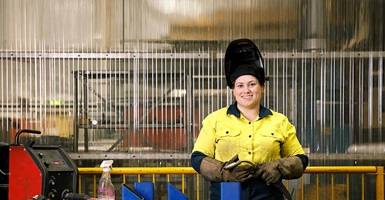Each day dentists see many patients, performing oral exams and dental health care procedures.
Right alongside them, ensuring everything runs smoothly, are dental assistants.
Dental assistants can provide assistance during procedures and also play an important role in the administrative aspect of running a dental practice.
Why choose dental assisting?
If you have an interest in health, dental assisting may be for you. You’ll be able to support the dental practitioner, as well as making patients feel welcome and at ease. You’ll also be able to combine administrative skills with clinical skills, meaning this career is full of variety.
What attributes do dental assistants need?
To become a successful dental assistant, you’ll need to be good with your hands (some of those instruments are tiny!), be able to concentrate and follow instructions. You’ll also need to have good interpersonal skills and the ability to make people feel comfortable. It will also help if you’re patient and understanding.
You should also have good organisational and time management skills and have an interest in healthcare work.
What do dental assistants do?
Dental assistants carry out a range of admin, clinical and patient care tasks.
Typical admin tasks include greeting patients, making appointments, sending out reminders, looking after accounts and maintaining and restocking dental supplies.
During treatment, you’ll be required to hand instruments and materials to the dental practitioner, as well as operating the handheld suction or water-spraying equipment. You may also need to process, mount and file dental x-rays, record findings from dental examinations, and provide patients with instructions before and after their treatments.
You’ll also need to clean and sterilise instruments, implement standard decontamination procedures to ensure infection control, prepare the surgery and set up instruments and materials for the next patient.
What are the challenges?
Chisholm Institute dental teacher Lisa Petty says dental assisting can sometimes be complex, and you’ll need to be able to work well under pressure, especially when procedures need to be completed quickly.
“Providing patient comfort, communicating effectively and empathetically can also be a challenge, especially if you’re in a negative situation,” Lisa says. “Dealing with verbally abusive people because they’re in pain can be particularly difficult.”
Dental assisting courses and career pathways
The Certificate III in Dental Assisting qualifies you to work as a health care assistant to dentists, dental hygienist or a dental therapist. This qualification can also be a stepping stone towards taking on further study and gaining higher qualifications such as further training in radiography, which will qualify you to prepare and produce dental x-rays.
The course includes work placement, which is an opportunity for you to gain on-the-job experience during your studies. Or, you can complete the course on the job as a workplace trainee in a dental practice.
What are the job opportunities like?
With strong growth predicted for dental assistant jobs, Lisa says there are various opportunities available, whether you choose solo or group dental practices, public health dentistry, dental school clinics, special needs dentistry or specialist practices.
“Some dental assistant students are offered jobs from their host clinics after their placements,” she says.


